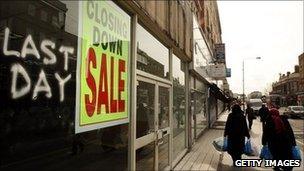UK retailers facing tough decade, Item Club predicts
- Published

Even in London - where sales are expected to grow more quickly - trade will not fully recover until 2013
UK retailers could be facing many years of poor sales growth, an economic think tank has said.
Consumer spending is expected to rise by only 2% a year in the 10 years up to 2020, according to Ernst & Young's Item Club, external.
Spending is being weighed down by debt repayments, restricted lending and high inflation, with the prospect of interest rate rises yet to come.
The effect is expected to be harshest outside London, the Item Club said.
Downside risks
For the UK as a whole, spending is expected to rise by only 0.6% this year and by 1.3% in 2012.
And even though spending in London is expected to pick up by a relatively robust 1.5% this year, total spending in the capital - as across the whole country - will still not fully recover to pre-recession levels until 2013, the Item Club predicts.
Data shows that spending remained nearly 4% below its peak level during the last three months of 2010.
Technology and leisure retailers are expected to be best positioned for any rebound in spending, thanks to falling prices and technological advances.
In contrast, the outlook for sectors that are most sensitive to discretionary spending, such as hotels and restaurants, is bleak.
The Item Club repeatedly emphasised in its report that the risks to its forecast were "skewed to the downside".
In particular, a decision by the Bank of England to start raising interest rates sooner than expected and a resurgence of commodity price inflation were seen as the biggest threats to the recovery in household incomes and consumer spending.
Households' sensitivity to interest rates was seen as particularly acute, with 69% of mortgages on variable rate, and 43% of them interest-only.
"The squeeze on household budgets is only going to intensify this year, as the gap between high inflation and subdued wage growth continues to widen and we experience a second consecutive year of declining disposable incomes," said Andrew Goodwin, chief economic adviser to the Item Club.
The research group forecasts that disposable income will fall again in real terms this year, by 0.1%, thanks to continuing high price rises.
However, from mid-2012 real incomes are expected to begin gradually improving again, as more stable commodity prices lead to a fall in the rate of inflation.